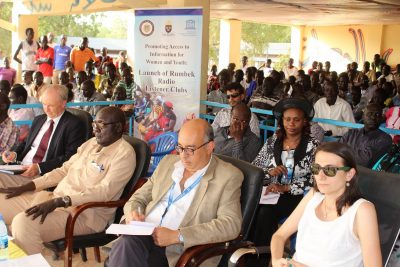By
Peter Louis
The United Nations Educational, Scientific and Cultural Organization (UNESCO) is promoting ‘radio listener clubs’ in South Sudan as a community based communication platform, to provide women and youths in rural areas access to information, equal representation and participation in decision-making.
The women and youth radio listener clubs have provided a dialogue platform for addressing issues at community level and in local languages, with a view to finding home grown solutions to the issues affecting communities in South Sudan.
With the generous financial support from the Swedish Government, four radio listener clubs have been established in collaboration with the Southern Sudanese Women General Association, the Catholic Radio Network Voice of Hope radio station in Wau and Good News radio station in Rumbek, while four more in Awerial and Pibor are currently being established.
Noting that radio is the most accessible means of communication, especially where illiteracy levels are very high, UNESCO Representative to South Sudan Salah Khaled has urged community radios to establish more radio listener clubs as a platform for accelerating women and youth access to information and education, and for amplifying their voices on social, economic and cultural challenges and participation in the peace building initiatives within their communities.
Speaking during the launch of the Women and Youth Radio listener clubs in Rumbek, Ola Nilsmo, the Counselor for Development Cooperation at Embassy of Sweden in South Sudan, urged women and the youths to take a key role in peace building and development of their country, since they are the future of South Sudan. “What you are doing here in Rumbek through radio listener clubs, engaging women and youth, is very impressive. What you are doing, supported with free press, should bring development to the country” said Mr. Nilsmo.
Echoing these sentiments, Angelina Inheim Akheich the chairperson of the Rumbek Women Radio Listening club said that in their listening club discussions they are “interrogating subjects once considered taboo, such as sexual violence and early child marriages. It is through radio listener clubs that we can strengthen their capacity to listen to the opinions of other actors, both men and women, with a view to finding home grown solutions for eliminating these negative vices in their communities.”
Members of the radio listener clubs have been capacitated with basic journalism skills including community participation in listening, providing feedback, gathering information and producing pre-recorded programmes to their community radio stations. To facilitate communication between the listener club members and the radio stations and ensure mobility in gathering, packaging and reporting, UNESCO has donated bicycles, handheld radio sets, smart mobile phones, digital audio recorders and rechargeable batteries to Wau and Rumbek Radio listener clubs.
UNESCO as the lead UN agency on the promotion of freedom of expression is supporting Women and Youth Listener clubs within its action to promote an enabling environment for freedom of expression and access to information for women and youth. Similar initiatives are currently being undertaken in Awerial-Yirol community radio, in collaboration with the Community Empowerment for Progress Organization (CEPO) and in Pibor community radio station, an initiative co-financed by UNESCO and the South Sudan UN Resident Coordinator’s Office.



No Comments Yet!
You can be first to comment this post!